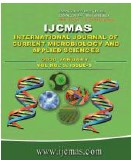


 National Academy of Agricultural Sciences (NAAS)
National Academy of Agricultural Sciences (NAAS)

|
PRINT ISSN : 2319-7692
Online ISSN : 2319-7706 Issues : 12 per year Publisher : Excellent Publishers Email : editorijcmas@gmail.com / submit@ijcmas.com Editor-in-chief: Dr.M.Prakash Index Copernicus ICV 2018: 95.39 NAAS RATING 2020: 5.38 |
Maize is one of the most important grain crops in South Asia and is produced throughout the country under diverse environments. The grain of quality protein maize (QPM) varieties contain nearly twice as much lysine and tryptophan, amino acids that are essential for humans and monogastric animals. Evaluation of maize hybrids under different environments would be useful for identifying hybrids that combine stability with high yield potential for diverse environments. This study was conducted to evaluate 30 maize hybrids and 06 parents including two checks (Shaktiman-3 & Shaktiman-4) to study the stability parameters for grain yield per plant and quality parameters under varied environmental conditions. Among the different environments studied environment-5 (Rabi seasons) recorded the highest and positive environment index for the trait grain yield per plant. Hence, this trait appeared to be the most favourable for environment-5. The environment-2(Kharif seasons) was favourable for the expression of lysine and tryptophan content in kernel protein since it had positive and high environmental index. Hence, these traits appeared to be the most favourable for environment-2. The hybrid CML161 x CML171 responded favourably under all environment, whereas the hybrid CML167 x CML171 suitable for rich environment (Rabi season) and the hybrid 167x161 suitable for poor environment (Kharif season) for higher grain yield per plant. The hybrid CML 161 x CML 171 and VL 1037 x VL1056 stable for all the six environments and it is adaptable to wider environments for yield and quality parameters. Therefore, these aforesaid maize hybrids are the promising genotypes in future for evolution of location specific superior maize hybrids for different maize growing situations.
 |
 |
 |
 |
 |